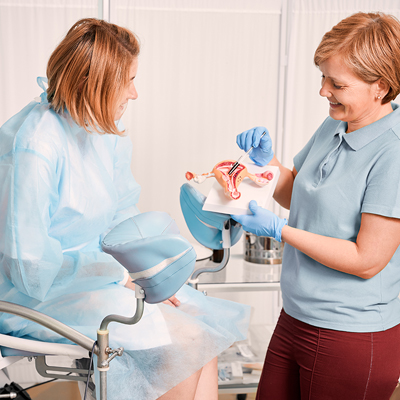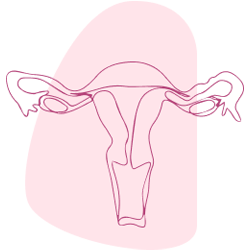Cervical Screening
About cervical screening, how it’s done and when to have it
The cervix is the lower part of the uterus that connects to the vagina. It’s quite a small tube of tissue 2-3cm long.
Cervical cancer happens when cancerous cells grow on the cervix, and affects around 900 people each year in Australia. This cancer can be detected early with cervical screening.

What is cervical screening?
Many women will be familiar with the Pap test (Pap smear). This is a test that collects cells from the cervix and examines them to see if they may be, or become, cancerous. But since 2017 in Australia, the Pap test has been replaced by the Cervical Screening Test.
While the method of collecting the sample of cells is similar, the new Cervical Screening Test:
- detects the human papillomavirus (HPV), which causes almost all cases of cervical cancer
- is offered to women aged 25 to 74 (rather than from 18 years)
- is done every 5 years instead of every 2 years.


When should I have a cervical screening test?
If you’re 25 and had sex even once, you will have a Cervical Screening test once every five years. You will still need a Cervical Screening Test even if you have been vaccinated against HPV.
If it’s been 2 years since your last Pap test, you are due for your first Cervical Screening Test.
Doctors at Venus Women’s Clinics perform the Cervical Screening Test and aim to make the experience as comfortable and stress-free as possible.
How is the cervical screening test done?
Like the Pap test, you lie on your back with your knees bent and apart while the doctor or nurse inserts an instrument called a speculum into your vagina. This helps them see the cervix. Then they take a sample of cells from the cervix using a brush type instrument.
Your sample is put into a tube containing sent to the laboratory.


What happens after cervical screening?
Your doctor will talk to you about the results, which could indicate:
- No HPV infection. Your next test will be in 5 years.
- HPV infection.Most likely, your body will take care of the infection. You will need another cervical screening test in 12. If you still have the HPV infection after 12 months, you may need to see a specialist.
- You have a certain type of HPV, or abnormal cells were found. You’ll be referred for more tests to determine the nature of the problem.
- The laboratory could not read your sample. You’ll need to repeat the test in 6 to 12 weeks.
What should I do if I think I need cervical screening?
If it’s time for your Cervical Screening Test, or if you’re not sure, Venus Women’s Clinics can help. We offer cervical screening, and understand that some people find the procedure difficult. Put your health first with the caring and compassionate health professionals at Venus Women’s Clinics.

NOTE: While it is reviewed for clinical accuracy, the content on the Venus Women’s Clinic website does not replace professional advice. This information should not be used as an alternative to professional healthcare. If you have a particular medical problem, please consult a doctor or a specialist.

